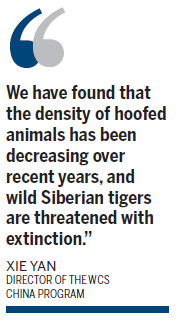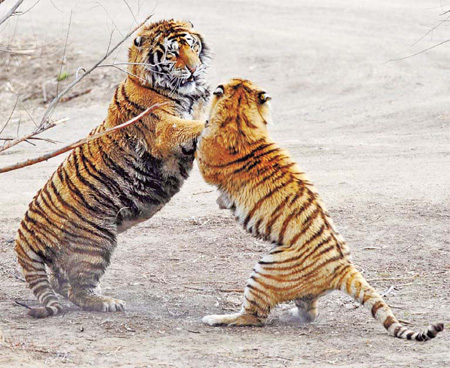Volunteers to clear traps in animal protection drive
|
Two Siberian tigers wrestle at the Heilongjiang Siberian Tiger Park. The number of the captive tigers is increasing even as they are threatened in the wild. Wang Jianwei / Xinhua |

Local hunters 'need to know' the harm done by poaching
HARBIN - Ninety Chinese volunteers from across the country will be chosen to clear traps set for endangered wild Siberian tigers in northeast China again this winter.
The trap-clearing campaign will be jointly sponsored by the New York-based non-profit organization Wildlife Conservation Society (WCS), the Heilongjiang Provincial Department of Forestry, the Heilongjiang Provincial Administration of Forest Industry and the Harbin Daily Newspaper Group, said Wang Lin, head of the trap-clearing team.
From Jan 7 to 14, the 90 volunteers will clear iron wire ring traps - set by poachers to catch the tigers during the winter - from six areas in Heilongjiang where the animals roam, Wang said.
Volunteers of all ages will be chosen from among hundreds of applicants and will include civil servants, university students, teachers, journalists, doctors and company executives, Wang said.
"We must let more people, especially local hunters, know the harm of setting traps for tigers," said volunteer Shi Dalei, a senior at the Heilongjiang Institute of Technology.
The Siberian tiger, an endangered species, is a subspecies of tiger that once roamed western and central Asia and eastern Russia.
A wild Siberian tiger was found dead with a trap around its neck in Mishan, Heilongjiang in late October, prompting environmentalists to call for better wildlife protection.
"It is an urgent task for us to protect wild Siberian tigers. I hope more people join us to contribute to wildlife protection," Wang said.
During the 2011 trap-clearing campaign in January in Heilongjiang, about 100 volunteers braved frigid weather with temperatures as low as -30 C to clear 304 traps within a week.
Compared with a decade ago, China has achieved much improvement in the protection of wild Siberian tigers, but problems persist, said Xie Yan, director of the WCS China Program.
"We have found that the density of hoofed animals has been decreasing over recent years, and wild Siberian tigers are threatened with extinction," Xie said.
"The problem of animal traps is a priority for us. We should actively participate in the trap-clearing campaign."
Xinhua



















